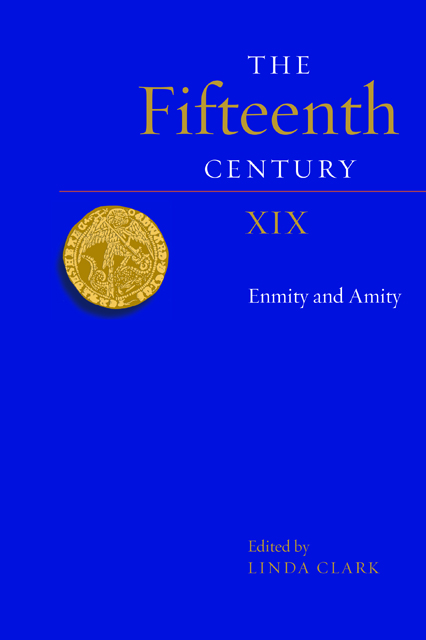Book contents
- Frontmatter
- Contents
- List of Contributors
- Preface
- List of Abbreviations
- England and Europe, c.1450–1520: Nostalgia or New Opportunities?
- Mariners and Marauders: A Case Study of Fowey during the Hundred Years’ War, c.1400–c.1453
- Henry V’s Army of 1417
- ‘Get out of our land, Englishmen’. French Reactions to the English Invasion of 1512–13
- Encountering the ‘Duche’ in Margery Kempe’s Lynn
- ‘C’est le Beaulté de Castille et d’Espaigne, qui le Soleil cler d’Austrice accompaigne’: Jean Molinet makes the Habsburgs Burgundian
- Magna Carta in the Late Middle Ages, c.1320–c.1520
- The Business of the Southern Convocation in 1462
- Index
- Contents of Previous Volumes
Magna Carta in the Late Middle Ages, c.1320–c.1520
Published online by Cambridge University Press: 20 December 2022
- Frontmatter
- Contents
- List of Contributors
- Preface
- List of Abbreviations
- England and Europe, c.1450–1520: Nostalgia or New Opportunities?
- Mariners and Marauders: A Case Study of Fowey during the Hundred Years’ War, c.1400–c.1453
- Henry V’s Army of 1417
- ‘Get out of our land, Englishmen’. French Reactions to the English Invasion of 1512–13
- Encountering the ‘Duche’ in Margery Kempe’s Lynn
- ‘C’est le Beaulté de Castille et d’Espaigne, qui le Soleil cler d’Austrice accompaigne’: Jean Molinet makes the Habsburgs Burgundian
- Magna Carta in the Late Middle Ages, c.1320–c.1520
- The Business of the Southern Convocation in 1462
- Index
- Contents of Previous Volumes
Summary
In the fullest and most stimulating recent review of Magna Carta’s role in the legal and political life of late medieval England, Anthony Musson has argued powerfully for the continued importance of the Charter as a source of protection for the individual in the two-and-a-half centuries from 1215. In the late Middle Ages, Professor Musson argues, the Charter attained the status of pre-eminent statute of the realm, regularly proclaimed in the county courts, repeatedly cited by litigants claiming redress on the tenor of its clauses, and symbolically placed at the head of the legislative canon in the books of statutes which lawyers compiled to aid them in their work. For any litigant drawn into actions for which its clauses provided either legal support or rhetorical justification, Professor Musson continues, Magna Carta had an immediate significance both as a source of law and as evidence of historic authority. At the same time, he adds, the Charter’s continuing relevance was affirmed by a series of statutes passed in Edward III’s reign – the so-called six statutes – which both glossed the Charter’s meaning and, in some cases, significantly extended its provisions and enlarged the constituency to which those provisions applied. An altogether different view of the Charter’s late medieval significance has been taken by some other recent writers, notably Ralph Turner and Christine Carpenter, who both see it as becoming an anachronism by the fifteenth century, made obsolete by changes in society and overtaken by new priorities in disputes between kings and subjects. According to Professor Turner, Magna Carta ‘had slipped into the shadows of high politics by the mid-fifteenth century [and was] to remain [there] until the seventeenth century’. In his estimation, while the lawyers and landowning class looked to its clauses for vindication of their property rights, most people were more concerned with confronting economic change and curbing endemic lawlessness than with preserving constraints on royal power. According to Professor Carpenter, who takes a similar line, albeit one less rhetorically expressed, once the Charter’s limits on royal power were accepted by kings, the Charter itself ‘largely disappeared as an active element in English politics’, in 1399 cited only as part of the condemnation of such kings as Richard II ‘who bucked the trend by abusing or overriding the law’.
- Type
- Chapter
- Information
- The Fifteenth Century XIXEnmity and Amity, pp. 123 - 136Publisher: Boydell & BrewerPrint publication year: 2022



